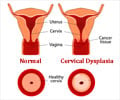Research underscores TikTok's role in promoting regular cervical cancer screening, emphasizing its potential as an educational platform.

Can Videos on TikTok Improve Pap Smear Attitudes and Intentions? Effects of Source and Autonomy Support in Short-Form Health Videos
Go to source). Pap smears are considered the primary screening method for cervical cancer, responsible for approximately 4,000 annual deaths among women in the United States. TikTok and other short-form video platforms are booming in popularity — for entertainment and for sharing information, including health information.
Navigating Health Information on TikTok: A Closer Look at Cervical Cancer Awareness
“With TikTok, there have been a lot of news reports about how people, especially Gen Z, are using the platform as a source for health information,” Kirkpatrick said. “(My co-author and I) noticed that there was a lot of health messaging regarding pap smears, which are a really important preventative measure for cervical cancer. We were fascinated by what was being shared, and then we also found out that there has been a decline in the number of women in the U.S. who are getting a pap smear.”‘Short video formats, such as TikToks, have the potential to educate women on the significance of regular pap smears as a means to detect cervical cancer. #cervicalcancer #tiktok #papsmear ’





Regular pap tests are a crucial piece in the prevention of cervical cancer because the disease often develops without symptoms. Pap smears are recommended every three years in most populations by the American Congress of Obstetricians and Gynecologists. In recent years, more women are skipping their pap tests. Overdue cervical cancer screenings jumped from 14% of women in 2005 to 23% in 2019, according to the National Institutes of Health. In the study’s experiment, 636 females, aged 21-29, viewed videos that simulated those on TikTok about pap smears, varying in source (doctor or peer) and level of autonomy support — using either controlling/demanding language or language supportive of one’s choice. They then rated the videos for perceived message effectiveness, credibility, attitude toward message, and engagement intention.
They found that doctors were deemed more credible than peer sources, and that autonomy-supportive videos delivered by a doctor improved attitude toward the message and toward getting a pap test more than the peer videos. Regardless of source, autonomy-supportive messages were significantly more likely to receive engagement in the form of likes or shares.
“While autonomy support didn’t have a direct effect on their behavioral intention to get a pap smear, it helped with the engagement factor, which could lead more people to being exposed to the message,” Kirkpatrick said. “That’s important because the literature on pap smear rates has shown that one of the key reasons why women aren’t getting pap smears is because they simply don’t know that it’s something they should be doing. Getting that information in front of more people through engagement with a video can help overcome that barrier.”
Kirkpatrick said the results provide evidence that doctors creating short-form video content about pap smears is time well spent, but that peer messages play a role, too.
Advertisement
Kirkpatrick suspects the findings would translate to videos encouraging other preventative screenings and said that should be explored further. Currently, Kirkpatrick is also examining why more young women are turning to TikTok for health information.
Advertisement
Reference:
- Can Videos on TikTok Improve Pap Smear Attitudes and Intentions? Effects of Source and Autonomy Support in Short-Form Health Videos - (https://www.tandfonline.com/doi/abs/10.1080/10410236.2023.2254962)
Source-Eurekalert















